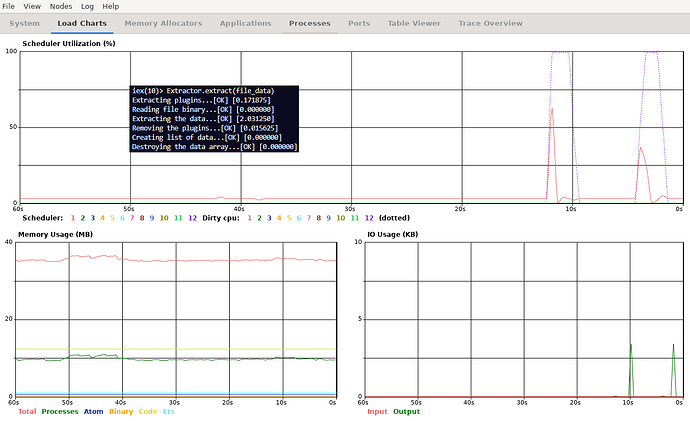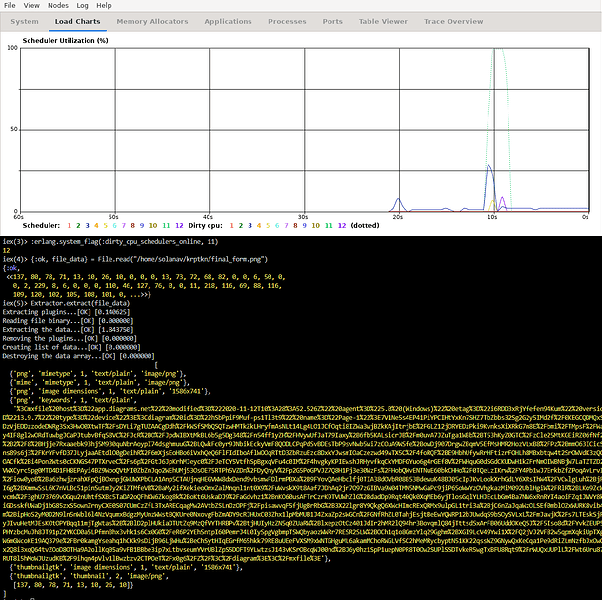I don’t know how useful this is, I’m just running iex -S mix on my NIF, it’s not running in production or anything, but I hope it helps.
Is it possible to run erlang:system_info to check schedulers_state, scheduling_statistics, dirty_cpu_schedulers_online, dirty_cpu_schedulers
iex(1)> {:ok, file_data} = File.read("/home/solanav/krptkn/final_form.png")
{:ok,
<<137, 80, 78, 71, 13, 10, 26, 10, 0, 0, 0, 13, 73, 72, 68, 82, 0, 0, 6, 50, 0,
0, 2, 229, 8, 6, 0, 0, 0, 110, 46, 127, 76, 0, 0, 11, 218, 116, 69, 88, 116,
109, 120, 102, 105, 108, 101, 0, ...>>}
iex(2)> Extractor.extract(file_data)
Extracting plugins...[OK] [0.046875]
Reading file binary...[OK] [0.000000]
Extracting the data...[OK] [0.218750]
Removing the plugins...[OK] [0.000000]
Creating list of data...[OK] [0.000000]
Destroying the data array...[OK] [0.000000]
[
{'png', 'mimetype', 1, 'text/plain', 'image/png'},
{'png', 'image dimensions', 1, 'text/plain', '1586x741'},
{'mime', 'mimetype', 1, 'text/plain', 'image/png'},
{'png', 'keywords', 1, 'text/plain', 'url encoded data'},
{'thumbnailgtk', 'image dimensions', 1, 'text/plain', '1586x741'},
{'thumbnailgtk', 'thumbnail', 2, 'image/png', [137, 80, 78, 71, 13, 10, 26, 10]},
{'gstreamer', 'mimetype', 1, 'text/plain', 'image/png'},
{'gstreamer', 'video dimensions', 1, 'text/plain', '1586x741'},
{'gstreamer', 'video depth', 1, 'text/plain', '32'},
{'gstreamer', 'pixel aspect ratio', 1, 'text/plain', '1/1'}
]
iex(3)> :erlang.system_info(:schedulers_state)
{12, 12, 12}
iex(4)> :erlang.system_info(:scheduling_statistics)
[
{:process_max, 0, 0},
{:process_high, 0, 0},
{:process_normal, 0, 0},
{:process_low, 0, 0},
{:port, 0, 0}
]
iex(5)> :erlang.system_info(:dirty_cpu_schedulers_online)
12
iex(6)> :erlang.system_info(:dirty_cpu_schedulers)
12
And the most useful would be to check schedulers using microstate accounting? msacc:start(1000), msacc:print(), msacc:stop(). Might not be wise to use it in a production env…
Here I did :msacc.start(1000), ran the NIF, printed and then stopped.
iex(8)> :msacc.print()
Average thread real-time : 1001601 us
Accumulated system run-time : 7208 us
Average scheduler run-time : 593 us
Thread aux check_io emulator gc other port sleep
Stats per thread:
async( 0) 0.00% 0.00% 0.00% 0.00% 0.00% 0.00% 100.00%
aux( 1) 0.00% 0.00% 0.00% 0.00% 0.00% 0.00% 99.99%
dirty_cpu_( 1) 0.00% 0.00% 0.00% 0.00% 0.00% 0.00% 100.00%
dirty_cpu_( 2) 0.00% 0.00% 0.00% 0.00% 0.00% 0.00% 100.00%
dirty_cpu_( 3) 0.00% 0.00% 0.00% 0.00% 0.00% 0.00% 100.00%
dirty_cpu_( 4) 0.00% 0.00% 0.00% 0.00% 0.00% 0.00% 100.00%
dirty_cpu_( 5) 0.00% 0.00% 0.00% 0.00% 0.00% 0.00% 100.00%
dirty_cpu_( 6) 0.00% 0.00% 0.00% 0.00% 0.00% 0.00% 100.00%
dirty_cpu_( 7) 0.00% 0.00% 0.00% 0.00% 0.00% 0.00% 100.00%
dirty_cpu_( 8) 0.00% 0.00% 0.00% 0.00% 0.00% 0.00% 100.00%
dirty_cpu_( 9) 0.00% 0.00% 0.00% 0.00% 0.00% 0.00% 100.00%
dirty_cpu_(10) 0.00% 0.00% 0.00% 0.00% 0.00% 0.00% 100.00%
dirty_cpu_(11) 0.00% 0.00% 0.00% 0.00% 0.00% 0.00% 100.00%
dirty_cpu_(12) 0.00% 0.00% 0.00% 0.00% 0.00% 0.00% 100.00%
dirty_io_s( 1) 0.00% 0.00% 0.00% 0.00% 0.00% 0.00% 100.00%
dirty_io_s( 2) 0.00% 0.00% 0.00% 0.00% 0.00% 0.00% 100.00%
dirty_io_s( 3) 0.00% 0.00% 0.00% 0.00% 0.00% 0.00% 100.00%
dirty_io_s( 4) 0.00% 0.00% 0.00% 0.00% 0.00% 0.00% 100.00%
dirty_io_s( 5) 0.00% 0.00% 0.00% 0.00% 0.00% 0.00% 100.00%
dirty_io_s( 6) 0.00% 0.00% 0.00% 0.00% 0.00% 0.00% 100.00%
dirty_io_s( 7) 0.00% 0.00% 0.00% 0.00% 0.00% 0.00% 100.00%
dirty_io_s( 8) 0.00% 0.00% 0.00% 0.00% 0.00% 0.00% 100.00%
dirty_io_s( 9) 0.00% 0.00% 0.00% 0.00% 0.00% 0.00% 100.00%
dirty_io_s(10) 0.00% 0.00% 0.00% 0.00% 0.00% 0.00% 100.00%
poll( 0) 0.00% 0.00% 0.00% 0.00% 0.00% 0.00% 100.00%
scheduler( 1) 0.00% 0.05% 0.00% 0.00% 0.00% 0.00% 99.94%
scheduler( 2) 0.00% 0.00% 0.00% 0.00% 0.06% 0.00% 99.94%
scheduler( 3) 0.00% 0.00% 0.00% 0.00% 0.06% 0.00% 99.94%
scheduler( 4) 0.00% 0.00% 0.00% 0.00% 0.07% 0.00% 99.93%
scheduler( 5) 0.00% 0.00% 0.00% 0.00% 0.06% 0.00% 99.94%
scheduler( 6) 0.00% 0.00% 0.00% 0.00% 0.06% 0.00% 99.94%
scheduler( 7) 0.00% 0.00% 0.00% 0.00% 0.01% 0.00% 99.99%
scheduler( 8) 0.00% 0.00% 0.00% 0.00% 0.06% 0.00% 99.94%
scheduler( 9) 0.00% 0.00% 0.00% 0.00% 0.06% 0.00% 99.94%
scheduler(10) 0.00% 0.00% 0.00% 0.00% 0.06% 0.00% 99.94%
scheduler(11) 0.00% 0.00% 0.00% 0.00% 0.06% 0.00% 99.94%
scheduler(12) 0.00% 0.00% 0.00% 0.00% 0.06% 0.00% 99.94%
Stats per type:
async 0.00% 0.00% 0.00% 0.00% 0.00% 0.00% 100.00%
aux 0.00% 0.00% 0.00% 0.00% 0.00% 0.00% 99.99%
dirty_cpu_sche 0.00% 0.00% 0.00% 0.00% 0.00% 0.00% 100.00%
dirty_io_sched 0.00% 0.00% 0.00% 0.00% 0.00% 0.00% 100.00%
poll 0.00% 0.00% 0.00% 0.00% 0.00% 0.00% 100.00%
scheduler 0.00% 0.00% 0.00% 0.00% 0.05% 0.00% 99.94%
:ok





















